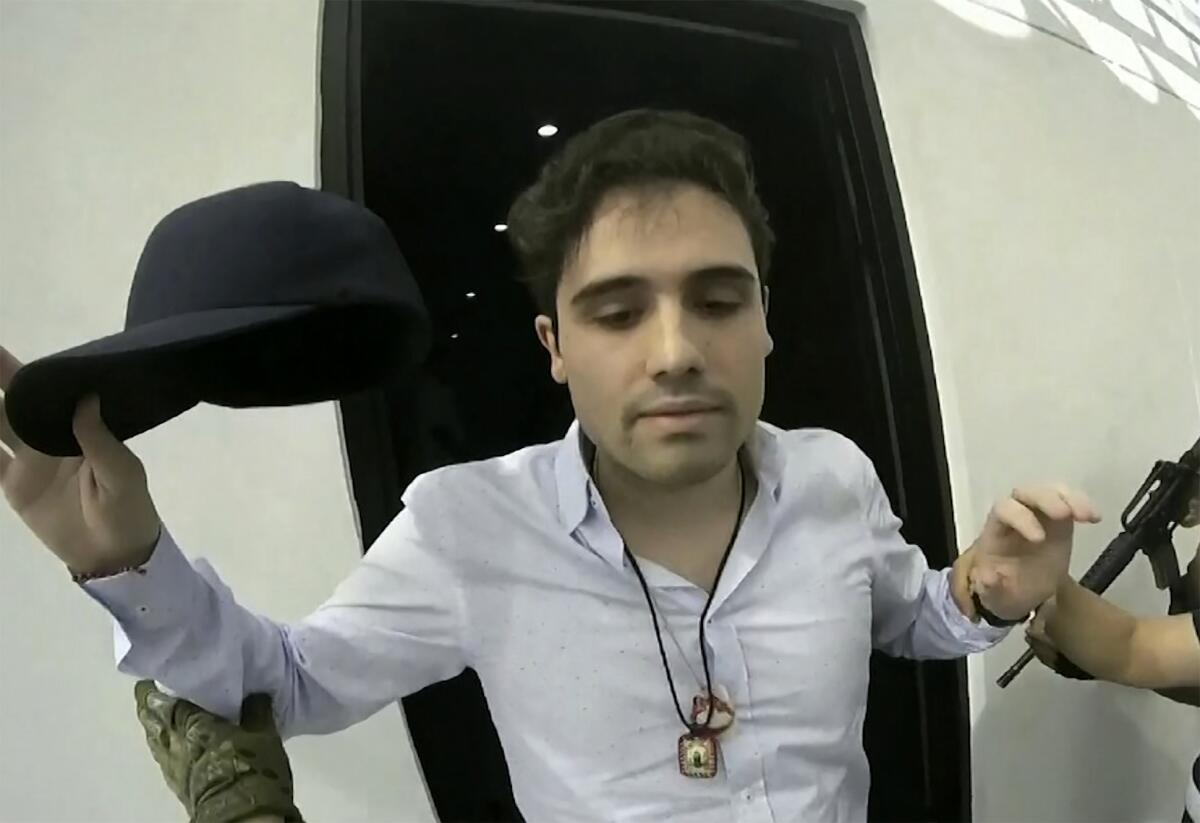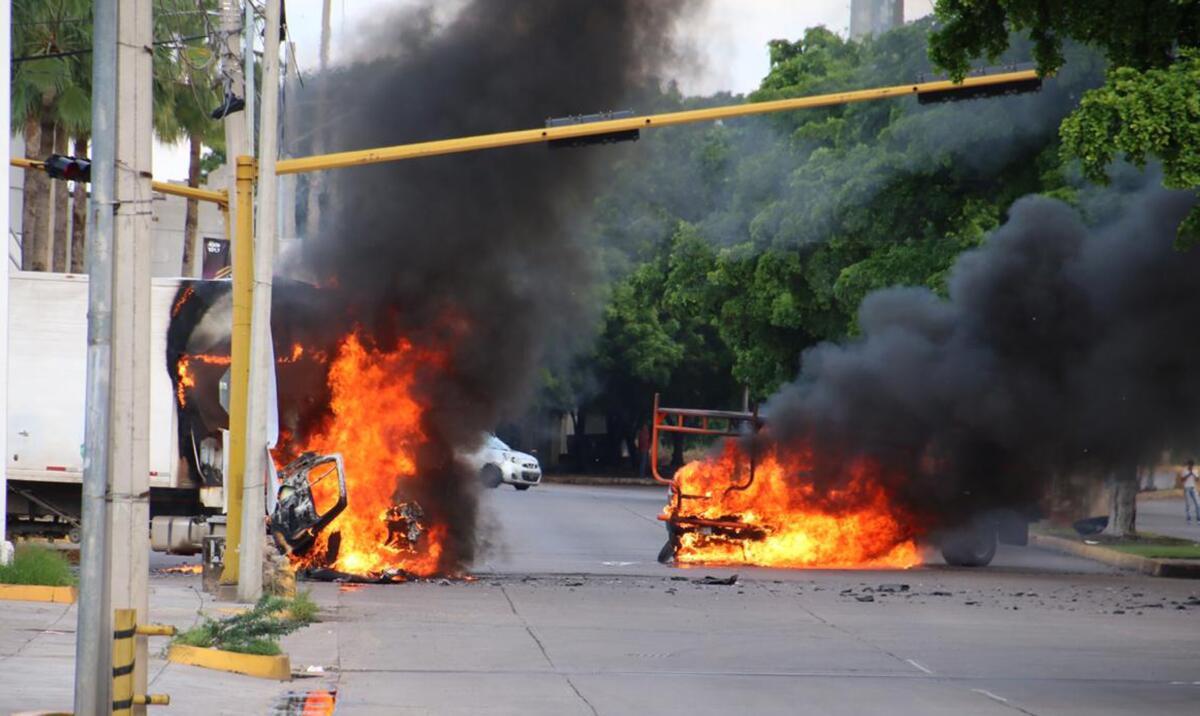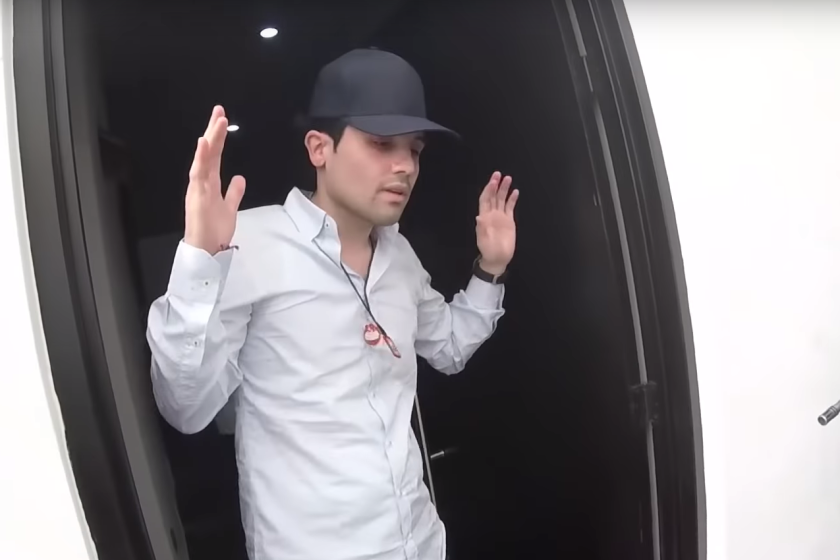Cartel lays siege to Mexican city after recapture of the son of ‘El Chapo’

MEXICO CITY — Armed men took hostages, burned vehicles and stormed an airport in northern Mexico on Thursday after federal forces captured Ovidio Guzmán, one of the world’s most wanted cartel leaders and the son of imprisoned drug lord Joaquín “El Chapo” Guzmán.
The 33-year-old drug boss was arrested after a predawn gunfight in a town north of the city of Culiacán, a stronghold of the Guzmáns’ Sinaloa cartel. Even as the cartel mounted attacks across the state, the air force was able to fly the younger Guzmán to Mexico City, said Mexican Secretary of Defense Luis Cresencio Sandoval González.
Officials canceled flights, suspended school and ordered residents to shelter in place as cartel members threw up road blockades in multiple cities, injuring at least 25 security forces and killing one. In Culiacán, Sandoval said, cartel fighters blocked all six entrances to the city and attacked a commercial airport and a nearby air force base. At least one commercial flight and an air force plane were hit with gunfire, officials said.
The cartel response appeared modeled after a bloody siege on Culiacán in 2019, the last time federal forces sought to capture Ovidio Guzmán.

In October of that year, members of Mexico’s newly formed national guard raided a luxurious Culiacán compound and subdued Guzmán, who has helped lead the Sinaloa cartel since his father was sentenced to life in prison in the United States.
But as agents were attempting to take him into custody, hundreds of Sinaloa fighters descended on the city, taking hostages, blocking intersections with burning vehicles and laying siege to a housing complex for the families of military personnel. Eight people were killed.
President Andrés Manuel López Obrador eventually ordered Guzmán’s release to avoid more bloodshed. “You can’t value the life of a delinquent over the lives of the people,” he said at the time.
Many Mexicans and U.S. law enforcement personnel were furious about the bungled operation, which they said humiliated federal forces and set a dangerous precedent.
A video shows Mexican forces were outgunned this month in a failed attempt to capture Sinaloa drug cartel chief Ovidio Guzman Lopez.
“It was a moral defeat for the entire Mexican state,” said Carlos A. Pérez Ricart, a security analyst at the Center for Research and Teaching in Economics in Mexico City.
“The figure of Ovidio Guzmán has been hanging over the consciousness of every Mexican ever since,” Pérez Ricart said. “Finally capturing him today is important from a material standpoint, but more than anything, it’s very important symbolically.”
The recapture of Guzmán came days before a scheduled visit to Mexico by President Biden, the first trip to the country by a U.S. president since 2014.
Many speculated that Guzman’s arrest was probably timed in part to please the Americans, who have grumbled about the efficacy of the Mexican president’s “hugs not bullets” crime-fighting strategy and his protection of a former defense minister charged by the U.S. prosecutors for collaborating with organized crime.
Retired Gen. Salvador Cienfuegos, who served as defense minister from 2012 to 2018, was arrested on suspicion of drug trafficking at Los Angeles International Airport in 2020 but released after López Obrador threatened to withhold future security cooperation with the U.S. unless Cienfuegos was freed.
The president later said Cienfuegos would not face charges in Mexico and accused the U.S. Drug Enforcement Administration of fabricating a case against him.
That incident, along with López Obrador’s decision to end the bi-national security pact known as the Mérida Initiative, outraged U.S. law enforcement officials.
But despite those tensions, López Obrador’s administration has delivered repeatedly on one key U.S. priority: the arrest of high-profile drug kingpins.
Just days after López Obrador met with Biden at the White House in July 2021, Mexican forces captured Rafael Caro Quintero, a cartel member believed to be behind the killing of U.S. DEA agent Enrique “Kiki” Camarena in 1985.
Jorge Israel, a human rights professor at the National Autonomous University of Mexico, said on Twitter that López Obrador was “cleaning house before Biden arrives.”
Former President Vicente Fox, a major critic of López Obrador, called the capture of Ovidio an obvious “gift” for Biden.
Foreign Minister Marcelo Ebrard said Thursday that the United States issued an extradition request for Guzmán several years ago, but that it is possible Guzmán will be tried on drug trafficking charges in Mexico.
Ovidio Guzmán is one of 10 children of “El Chapo,” the infamous drug lord who used innovative smuggling techniques to turn the Sinaloa drug cartel into one of the most powerful criminal organizations in the world.
After famously escaping from Mexican prison twice, El Chapo was extradited to the U.S. in 2017 and was convicted on 10 charges including money laundering and drug trafficking.
In the years since, Ovidio Guzmán and several of his brothers — a group known as the “Chapitos” — have battled for control of the organization against one of its earliest members, Ismael Zambada García, known as “El Mayo.”
At the same time, they have faced encroachments from rival drug trafficking groups, including the Jalisco New Generation cartel.
Some security experts said the government’s success in capturing Guzmán this time showed how much the Sinaloa cartel has changed.
“The context is very different now,” Pérez Ricart said. “Sinaloa has been weakened by internal conflicts.”
By the end of the day Thursday, Sinaloa Gov. Rubén Rocha Moya said authorities had regained control of the state. Crews began clearing the remains of burned-out vehicles, and local police sought to stop looters from raiding stores.
One local journalist, Marcos Vizcarra, spent several harrowing hours as a cartel hostage.
Vizcarra had been reporting on the violence early Thursday when armed gunmen seized his car. He and other civilians ended up at a Culiacán hotel, where the gunmen, he said, were “taking more keys to burn more cars.”
By early afternoon, with the cartel leader already in Mexico City, Vizcarra was allowed to leave and returned home to safety.
Cecilia Sánchez Vidal in The Times’ Mexico City bureau contributed to this report.
More to Read
Sign up for Essential California
The most important California stories and recommendations in your inbox every morning.
You may occasionally receive promotional content from the Los Angeles Times.












